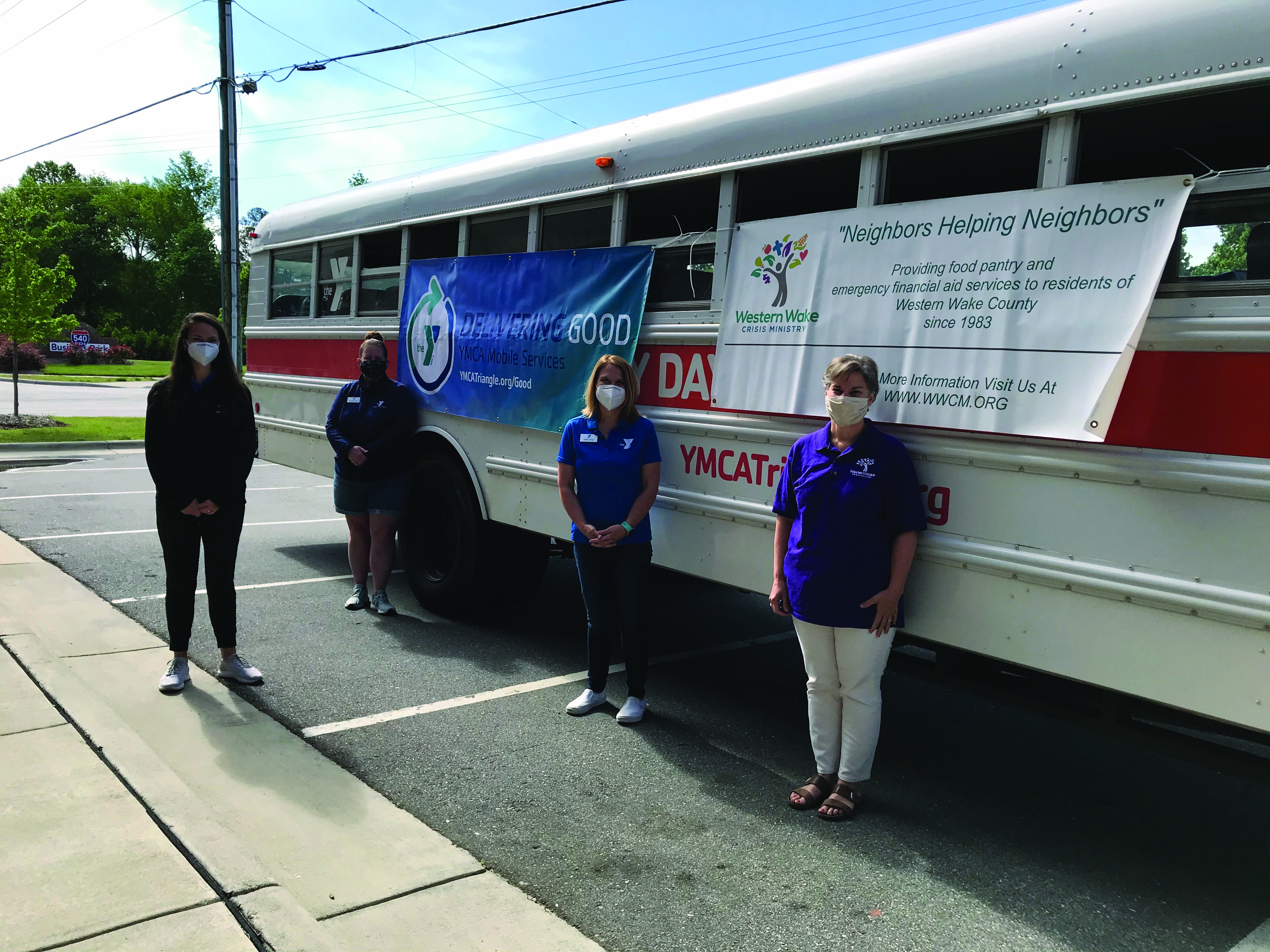Crisis doesnít discriminate. We have seen how an international health emergency can have a direct and dramatic impact on our jobs, our relationships, our childrenís education, our aging parentsí welfare, our security, and many other facets of life. Only we know how much our household can withstand. Only we know what combination of circumstances will weaken our foundation. Only we know which straw will be the one that breaks us. And one organization that is always there to pick up the pieces is Western Wake Crisis Ministry.
For more than three decades, Apex has been home to Western Wake Crisis Ministry (WWCM), a non-denominational nonprofit dedicated to area residents experiencing crises with hunger, housing, health, finances, and employment. A small staff and an army of volunteers ensure that eligible families and individuals in Southwest Wake County receive the aid they need. The food pantry, in particular, is vital as it allows a household to shop for fresh produce, canned goods, meat and dairy items, personal hygiene products, and other essentials free of charge every 30 days. With a shopping cart and plenty of options, people choose according to the preferences of their family.
Shifting Operations
In March, with talk of contact-free business practices in the news and a stay-at-home order looming, Beth Bordeaux, WWCM Executive Director, knew her process for the food pantry would have to change. For several days, she made a point of talking with the people who came in to shop. Everyone, including her own staff and volunteers, had concerns about maintaining safe social distance inside the building, but it hurt her to think about taking the dignity of choice away from food pantry visitors.
Bordeaux explained to her clients, “We’re not going to be able to do things at the same level; you’re not going to have choice anymore. I remember one lady saying, ‘When you need food, you need food.’ It was freeing for me because it gave me permission to [transition].”
The first week of curbside pickup was complicated with cars and people crowding the parking lot, so Bordeaux enlisted the Apex Police Department to design an efficient traffic pattern. With the pickup point moved to the rear of the building, volunteers rolled WWCM shopping carts out the warehouse door and put boxes of food directly into cars. The system worked well for a few weeks.
When the stay-at-home order went into effect, Bordeaux noticed that among the people still lining up for food were two gentlemen with serious medical conditions and many older clients, all of whom were jeopardizing their safety just by being out. Bordeaux told one of the gentlemen, “When you need food again, call us and we’ll bring it to you.” It was time for an operational shift to home delivery.
Bordeaux said she and her staff decided, “Best practice is people staying home, including us if possible.” But they were committed to providing home delivery for whoever needed it, so despite having cut back on volunteers, Bordeaux began calculating how many deliveries to do per day as well as lining up drivers and doing background checks. She said, “Even though it’s no-contact delivery, volunteers were still coming here and handling food and we wanted to be extra-cautious because we’re delivering to folks that are vulnerable.”
Tammi Greco, WWCM Operations and Pantry Manager, forwarded calls and emails to her home so she could safely track and coordinate weekly food deliveries. For a few days beginning April 1, boxes were grouped by driver and staged in the WWCM waiting area or outside on the sidewalk, with every box containing three to four bags (60-80 pounds) of food per household. Then, a handful of WWCM volunteers were given a list of addresses and five or six boxes to deliver.
‘A Perfect Solution’
As WWCM’s food pantry operations were shifting to 100% home-delivery, the Kraft Family YMCA—a branch of the YMCA of the Triangle—had also been temporarily closed to the public. For a community-centered organization that prides itself on “bringing people together,” suspending access to their facilities and on-site activities was jarring.
They developed creative ways to keep their members physically, emotionally, and academically engaged and healthy while adhering to the stay-at-home order. To meet an immediate need, YMCA of the Triangle staff partnered with medical professionals specializing in infectious diseases to create YMCA Camp Hope, a collection of child care camps across the Triangle for children of essential workers.
Angie Field, Executive Director of the Kraft Family YMCA, recognized that the stringent safety protocols for the camps were a best practice that could be shared with the broader community, but there were so many unknowns and the risk factors were considerable. Field said, “We had been talking with Beth about ways we could help [WWCM] before [the pandemic] started, so when she said, ‘We’ve had to stop curbside pickup,’ I said, ‘We have buses!’”
For Bordeaux, Field’s offer was “a perfect solution.”
On April 9, after a week of preparation during which WWCM spread the word about the new process and Greco scheduled the deliveries and mapped a route for each new driver, YMCA staff members arrived at the WWCM building with two buses. The timing couldn’t have been better since WWCM not only had their own food to deliver, they also had the monthly government-supplied food from the Food Bank of Central & Eastern NC which needed to be distributed to over 100 senior citizens in some of the same WWCM households. That same week, the YMCA’s assistance program was officially named Delivering Good: YMCA Mobile Services. Within days, the Y expanded Delivering Good to seven YMCA branches to serve even more families across the region.
To help put things in perspective, Western Wake Crisis Ministry typically provides groceries for an average of 248 households (795 individuals) per month. During March and April of 2020, WWCM saw a 36% increase with the impact of COVID-19. In addition, they addressed the needs of approximately 11 new households seeking food assistance monthly. However, in March and April of 2020, 71 new households (227 new individuals) received food support.
Bordeaux emphasized that “It’s not about how many boxes of food we can get out. If somebody calls and says they need food, we’re going to get it to them. We have not turned anybody down.”
Field said that the Kraft Family YMCA is happy to help. “We love it! We have a year-round tutoring program that supports kids who are falling behind or don’t meet grade level benchmarks in school. Our families are the same families that need [WWCM assistance] in this area. We’re able to connect our families immediately to Beth and Tammi gets them right in to receive food. Our core staff are the point people [on-site at WWCM], but YMCA staff from all over the Triangle are coming to help in the pantry and deliver food.”
McKenna Edwards, Family Programs Director at Northwest Cary YMCA, and Amanda Sulyi, Director of Membership and Administrative Services at Kraft Family YMCA, see big advantages in the fact that the YMCA bus draws attention in the communities where food is being delivered. “People get so excited and the kids are waving [to us].” They hand out flyers so more people will know that assistance is available. Field added, “By putting ‘Western Wake Crisis Ministry’ on our Facebook page and plugging them on our social media, we have people contacting us and wanting to help.”
WWCM Family Recovery Fund Is Needed in the New Normal
So, what will post-pandemic life look like? We really don’t know. But Bordeaux and Field are already brainstorming ways to continue providing support with funding limitations in mind. Bordeaux and her staff will contact each client as certain moratoriums are lifted. “We’ll ask, ‘Did you get your stimulus check, did unemployment come through for you, were you able to pay on this bill?’ Systems much bigger than Wake County are still figuring out how they’re going to use their money so we need to figure out how our dollars can be leveraged for the biggest impact on our families. We want to help folks get back to a stable position.”
To supplement their dollars, Bordeaux has established the Western Wake Crisis Ministry Family Recovery Fund to support families economically impacted by the pandemic. The goal is to raise $150,000 which will help WWCM broaden their scope of assistance. To read the FAQs about the fund and donate to the Family Recovery Fund, visit wwcm.org/familyrecoveryfund.
Not surprisingly, Bordeaux and Field expect changes to happen in phases. “We might shift back to curbside pickup, or partial curbside and partial home-delivery,” Bordeaux said. “And we’re going to work with the YMCA as long as they have people to send us. We want people who need to be able to stay home, to stay home.”
Field agreed. “We’re not going to immediately go back to the way we’ve always done things, but we will continue the partnership. Even if we get to a point where we have a bus but no driver, we have contacts in the community to help get people on buses. We’re a community. We are in this together and we will help each other. It’s not about one entity, it’s not about individuals, it’s about us coming together and making our community stronger.”
Bordeaux’s commitment to community is reflected in her WWCM policy: “’Nobody leaves empty-handed.’ There’s a lot of anxiety in the community right now. You hear so much about how there’s going to be a new normal and people are thinking about that, sometimes, in a negative way. But I also think there’s another new normal that’s going to be a positive outcome to this and it’s these kinds of relationships. It’s ways that we shine light on inequities so we can hopefully create policies and shift systems so that some of those inequities are broken down.”
For up-to-date information about Western Wake Crisis Ministry plans surrounding the COVID-19 pandemic, visit wwcm.org/covid19. Here you will find details about their most urgent needs, changes in their services, opportunities to get involved, lists of additional support resources, and food distribution sites. You can also find them on Facebook. For more information about the YMCA of the Triangle, visit YMCATriangle.org.








